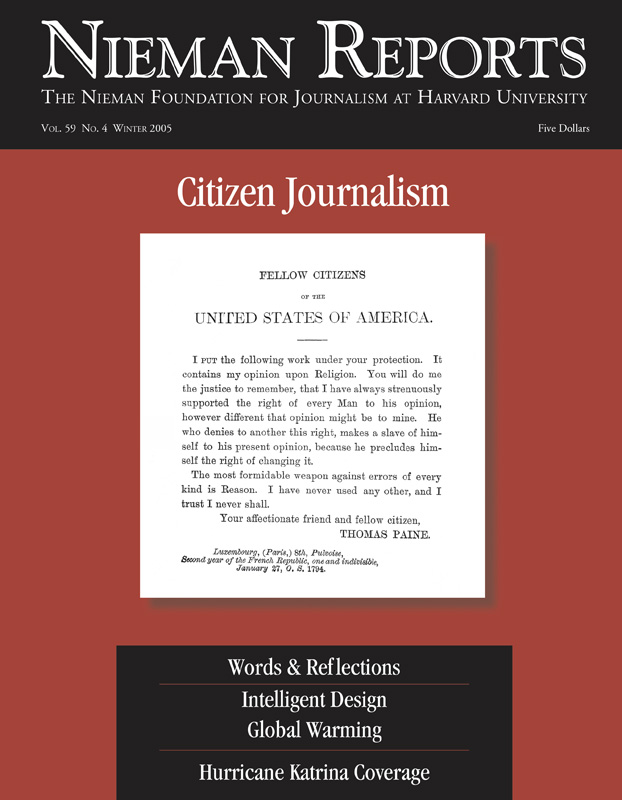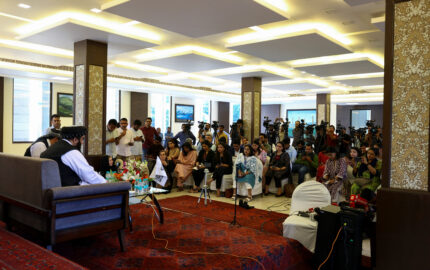“Night Draws Near: Iraq’s People in the Shadow of America’s War,” a book written by Washington Post correspondent Anthony Shadid, who won the 2004 Pulitzer Prize for his reporting from Iraq, “is filled with the kind of insights—and personal anecdotes—that only long conversations with Iraqis, and time in the country, can provide,” writes Patrick J. McDonnell, a former Baghdad bureau chief for the Los Angeles Times. In describing Shadid’s book as a “masterful account” of how the war and its aftermath affected Iraqi people, he observes that “its best moments are based on old-fashioned reporting, leavened with the kind of analysis that only a certain distance and time—and a touch of wisdom—can render.” Maggy Zanger, who in 2003 started a program to train Iraqi journalists in Baghdad, reflects on “an intimate journey into Iraqi lives” that is told by former National Public Radio correspondent Michael Goldfarb in “Ahmad’s War, Ahmad’s Peace: Surviving Under Saddam, Dying in the New Iraq.” In his book, Goldfarb writes about Ahmad Shawkat, an Iraqi Kurdish journalist, and his family, and about Shawkat’s death by assassination because of words he wrote and published.
In reading Karl Fleming’s book, “Son of the Rough South: An Uncivil Memoir,” Lester Sloan, a freelance photojournalist, came to understand how Fleming’s struggles as an abandoned child and adolescent—and his responses to them—prepared him well for the time when he’d report for Newsweek on the greatest story of his time: the civil rights movement. Jules Witcover’s book, “The Making of an Ink-Stained Wretch,” offers Des Moines Register political columnist David Yepsen “old ‘war’ stories about their trade” of covering campaigns, while reminding him that “the cacophony is noisier than in Witcover’s era, but it’s still better than the alternative of providing only a few sources of information for voters. The problem now is that there’s so much of it out there, people often don’t know where to turn for basic facts.”
Freelance reporter Peggy Simpson, who reported for many years from Poland, writes about Shana Penn’s book, “Solidarity’s Secret: The Women Who Defeated Communism in Poland.” It was, Penn reveals, a group of women journalists, hiding from government officials, who kept the Solidarity movement alive by publishing and distributing underground newspapers about the resistance movement. As Simpson writes, Penn “explores why the vital work of these women remained a secret to much of Poland after the fall of Communism.” Alvin Shuster, a former foreign editor with the Los Angeles Times, says that in writing “Discovering Russia: 200 Years of American Journalism,” Murray Seeger has “written a fascinating book about the hurdles they [American correspondents who worked in Russia] jumped, bureaucrats they confronted, diseases they fought, famines they survived, and tea leaves they read to portray the Russia they found.”
In reflecting on the film “Good Night, and Good Luck,” Don Aucoin, reporter and former TV critic for The Boston Globe, says that it’s “hard to watch this film without pondering what has become of broadcast journalism … [and] the sort of enterprise reporting and investigative digging that Murrow prided himself on ….” And Canadian freelance journalist Madelaine Drohan presents the predictable stages of scandal coverage, but wonders why “the media appear to lose interest once the central figure in a scandal has been punished” and walk away from the important watchdog stage of reporting when remedial action by authorities should be taken.
In reading Karl Fleming’s book, “Son of the Rough South: An Uncivil Memoir,” Lester Sloan, a freelance photojournalist, came to understand how Fleming’s struggles as an abandoned child and adolescent—and his responses to them—prepared him well for the time when he’d report for Newsweek on the greatest story of his time: the civil rights movement. Jules Witcover’s book, “The Making of an Ink-Stained Wretch,” offers Des Moines Register political columnist David Yepsen “old ‘war’ stories about their trade” of covering campaigns, while reminding him that “the cacophony is noisier than in Witcover’s era, but it’s still better than the alternative of providing only a few sources of information for voters. The problem now is that there’s so much of it out there, people often don’t know where to turn for basic facts.”
Freelance reporter Peggy Simpson, who reported for many years from Poland, writes about Shana Penn’s book, “Solidarity’s Secret: The Women Who Defeated Communism in Poland.” It was, Penn reveals, a group of women journalists, hiding from government officials, who kept the Solidarity movement alive by publishing and distributing underground newspapers about the resistance movement. As Simpson writes, Penn “explores why the vital work of these women remained a secret to much of Poland after the fall of Communism.” Alvin Shuster, a former foreign editor with the Los Angeles Times, says that in writing “Discovering Russia: 200 Years of American Journalism,” Murray Seeger has “written a fascinating book about the hurdles they [American correspondents who worked in Russia] jumped, bureaucrats they confronted, diseases they fought, famines they survived, and tea leaves they read to portray the Russia they found.”
In reflecting on the film “Good Night, and Good Luck,” Don Aucoin, reporter and former TV critic for The Boston Globe, says that it’s “hard to watch this film without pondering what has become of broadcast journalism … [and] the sort of enterprise reporting and investigative digging that Murrow prided himself on ….” And Canadian freelance journalist Madelaine Drohan presents the predictable stages of scandal coverage, but wonders why “the media appear to lose interest once the central figure in a scandal has been punished” and walk away from the important watchdog stage of reporting when remedial action by authorities should be taken.



